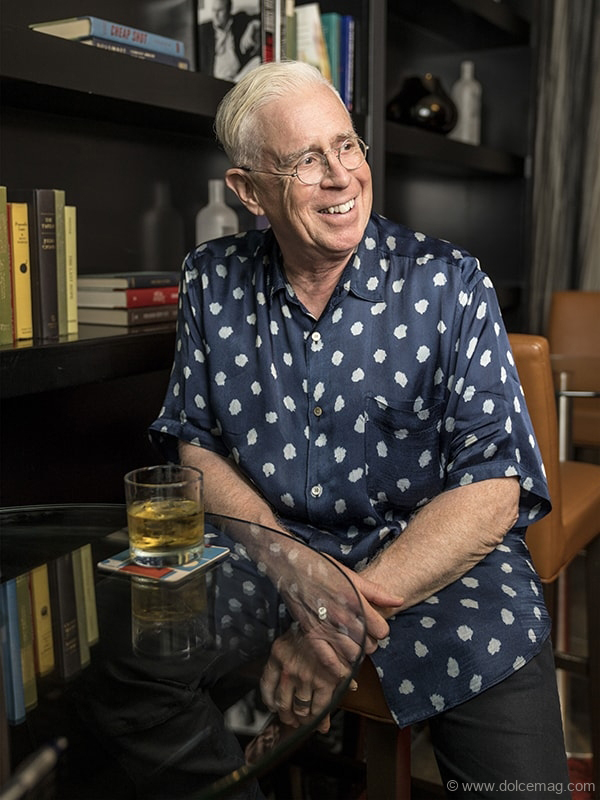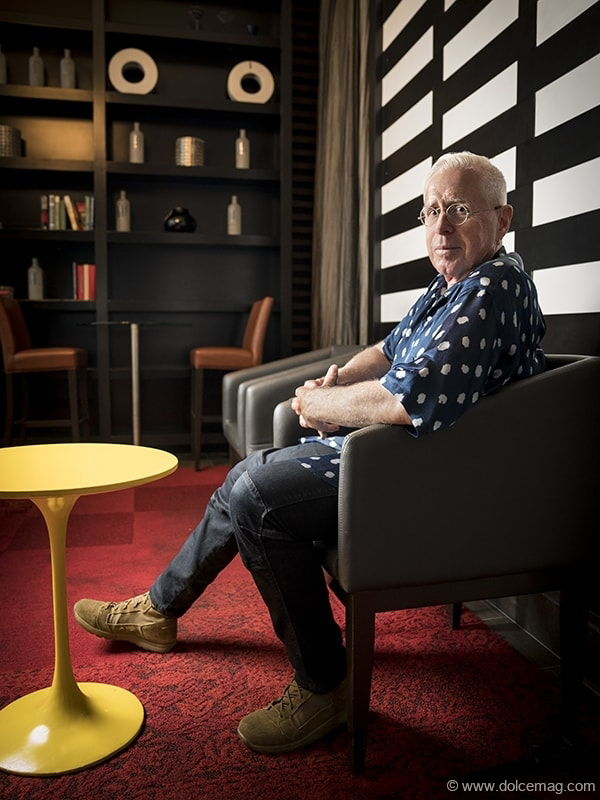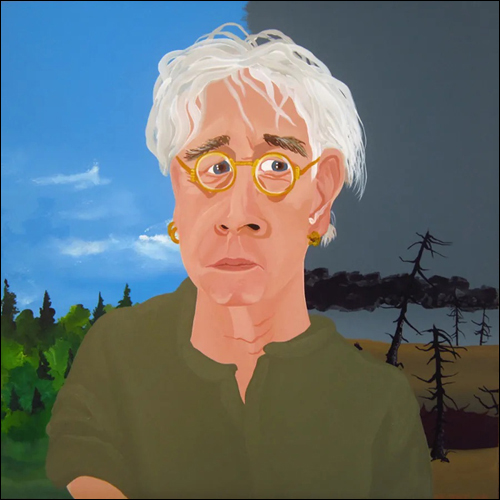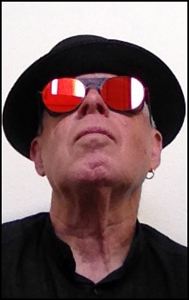11 October 2019 –
Musician Bruce Cockburn has been a singer and songwriter of poetic lyrics and bon mots for more than five decades.
In Conversation:
There are times when being a part of history, albeit a tumultuously famous (some might even say infamous) one, becomes a badge of honour, the tipping point from which many other seismic life events are launched. Toronto’s Yorkville scene in the mid-to-late 1960s and early 1970s was such a place. Although today’s well-heeled visitors to the area might not be able to fathom it, Yorkville in those earlier days was comparable, on a smaller scale, to New York’s bumping Greenwich Village. The hub of a creative, nonconformist, bohemian, longhaired subculture, Yorkville’s hippie scene was entrenched in a tie-dye plethora of folk, rock and jazz music, suede and leather-fringed jackets, a surfeit of free love and, oh yes, a lot of marijuana smoking, which five decades later would become legal — a fact that no one would have imagined at the time.

One of Yorkville’s greatest contributions to music aficionados was the exceptional quality of musicians who got their start in the 40-plus coffee houses and bars that dotted the streets of the Yorkville scene, which encompassed Hazelton Avenue, Cumberland Street, Avenue Road and Bay Street. The famed Penny Farthing coffee house attracted big-name talent such as James Taylor, and Simon & Garfunkel. And the renowned Riverboat Coffee House, where stars such as Joni Mitchell, Gordon Lightfoot and Neil Young played, is also where Ottawa native Bruce Cockburn — folk singer, songwriter, author and multiple Juno awardee — often played. On the big stage, the singer shared a concert bill with a who’s-who of musical proficiency, including The Jimi Hendrix Experience and Cream. With his ever-present round-rimmed spectacles, and his long, dark hair curling out from underneath a fedora trimmed with leather strips, Cockburn’s gentle, commanding voice and poetic lyrics captivated audiences. They knew all the words to his wildly popular, songs-for-the-decades hits, such as “Wondering Where the Lions Are” (1979), “Rumours of Glory” (1980), “The Trouble with Normal” (1983), “If I Had a Rocket Launcher” (1984), “Lovers in a Dangerous Time” (1984) and “Call It Democracy” (1986), to name just a few.
A man whose words shone like beacons in his lyrics, Cockburn’s ability to interact with others throughout his younger years was one that was fraught with angst and rage. “I was wrapped up in myself — not in a narcissistic way, but in terms of mistrust of the world. I was not open to other people,” Cockburn says. “A lot of my adult life has been a big learning curve in terms of empathizing and loving people. In the process of navigating through life, I have learned things — sometimes quickly, and sometimes as an uneven trickle. Every time there has been a discovery, there has likely been a song. We all have a lot in common throughout our lives, including scars. None of us gets out of our childhood/youth without some damage. The scars unite us; if we find those scars in a person and are open to the energy they offer from that place, then it is a binding agent. We are all in this together.”
After spending some time in Paris performing as a street musician, Cockburn attended Boston’s esteemed Berklee College of Music, where he spent a few semesters before quitting. “I was learning things at Berklee, but I had this strong feeling, a prompting that I needed to be elsewhere, do something else, which I’m still doing. Whatever predisposed me to listen to those promptings, it all worked out pretty well.”

Ironically, many decades later, Cockburn was awarded an honorary doctorate of music from Berklee. (One of many he has been awarded.) “I didn’t have to do the work and I got my degree,” he laughs. Cockburn’s awards are many: he is an inductee into the Canadian Music Hall of Fame (2001); recipient of the Allan Slaight Humanitarian Spirit Award (2014); an inductee into the Canadian Songwriters Hall of Fame (2017); and the 2017 recipient of the Folk Alliance International People’s Voice Award. All of these awards are certainly balms that boosted the confidence of Cockburn, who, throughout his 20s and 30s, felt like a stranger in a strange land. “It certainly softens the effect of feeling like a loner,” he says. “But the feeling of affection and embrace that comes from the audience is really what fills me.”
For an extensive part of his career, Cockburn was known as much for his sense of rage as he was for his mastery of music. He credits acquiring a sense of perspective on that rage as a part of growing up. “A lot of what I have written comes from that place [of rage],” he says. “When I wrote ‘If I Had a Rocket Launcher,’ I didn’t feel like I was venting. I know the song was the cause of head scratching for some people, but for me it was an expression of pain and outrage at what I felt — what I empathized with — which was the plight of the Guatemalan refugees. I was trying to paint an emotional picture of what I felt — it came from a deep place. How it was perceived by people who weren’t familiar with the situation was really an expression of their rage. The radio success of that song was a big surprise to me.”
“Every Time I Hear That Music I Am Transported To Some Windswept Headland, Sipping Whisky Out Of A Seashell”
Like many of his activist peers in the ’70s and ’80s, Cockburn used his music as a commentary on political events that were concerning to him. He does not consider himself an activist per se (he considers himself more in the domain of reactivism than activism), but his political voice and opinions have definitely resonated in an impactful way on a wide range of issues over the years, including native rights — particularly the Haida peoples’ struggles around land claims in British Columbia — as well as human rights atrocities in third-world countries, third-world debt and the ecological decline of the environment. His politicking has taken him to Guatemala, Mali, Mozambique, Cambodia, Vietnam and Nepal, to name a few. And while some of his politically active counterparts, such as Buffy Sainte-Marie, felt that their careers were impacted by their activism (Sainte-Marie discovered that the FBI had a file on her in the 1980s), Cockburn feels his outspokenness did not affect him. “I was inducted into the Order of Canada (1983), and then promoted to Officer of the Order of Canada (2003), so I don’t think that suggests any kind of repression,” he says. “I have allowed my mouthing off to be used for people who are truly activists, and I feel good about being allowed to be used that way, if the cause is good.”
The most active cause Cockburn is currently involved in is the raising of his daughter, Iona, who is seven. “I have limited time to be in her life and I want to make the most of it,” the singer says. Cockburn, 74, married his current wife, Mary Josephine (M.J.), an attorney, in 2014. “A lot of the kids think I am Iona’s grandfather,” Cockburn says, with not a twinge of awkwardness in his voice. A proud father, Cockburn describes Iona, who is bilingual, as sharp, independent and a constant source of amazing stuff. “She learns songs really fast and knows all of the lyrics to my songs; her favourite is ‘Call It Democracy,’ although I am not sure why.”
Jenny, now 43, is Cockburn’s daughter with his first wife, Kitty Macaulay. “When I was a parent in my 30s, I don’t think I was good at it. I was self-involved and focused on my art. But it all came out OK. Jenny has her PhD and teaches at a college in Montreal.”
Crowing Ignites, which is to be released in September, is Cockburn’s newest album. It was produced by Cockburn’s long-time friend and collaborator, guitarist and songwriter Colin Linden, whom the singer has known since he was 14. A fully instrumental album, Crowing Ignites (a literal translation of the Latin motto Accendit Cantu) embraces Cockburn’s Scottish heritage, one with which he feels a deep kinship. “As a Scottish Canadian, I feel like I am part of a continuous line, one that runs through from earlier times, and will hopefully continue. Somewhere, I am a little bead on that chain,” Cockburn says.
This newest album of Cockburn’s embodies a journey of musical experiences, including Tibetan cymbals, chimes and singing bowls — and, of course, the classical bagpipe music of Scotland, featuring a style of bagpipe musical effects called pibroch. “Every time I hear that music I am transported to some windswept headland, sipping whisky out of a seashell,” Cockburn says with a smile. “The effect is hypnotic and meditative — I get a rush when I hear it.”
Cockburn’s philosophy on life centres on taking what understandings and glimpses of life he experiences and sharing them through his songs. “I am the person I am because of all the stuff that I have been exposed to, which has resulted from the choices I have made, and the choices that I have been handed. I have always tried to be available to the next thing,” he says.
The anger and sense of rage that have been a lifelong and intrinsic part of Cockburn’s personality — the undercurrent that drove many of his lyrics, as well as his outspoken championship of many causes — seem to have been pinpricked, dissipating the pent-up helium of wrath. In its stead, there is an increased aura of thoughtful insight, a wry sense of humour and a relaxed sense of openness. In fact, I noticed in Cockburn a significant change from the 2016 interview I did with him (albeit over the phone). He feels warmer, more loquacious and willing to share an easy laugh.
“Behind the pain-fear etched on the faces, something is shining, like gold but better.” Certainly, these celebrated lyrics to “Rumours of Glory,” which Cockburn penned and sang with such elegance in 1980, seem to have come full circle, becoming a prescient way of life for the singer — whom author Nicholas Jennings called “a troubadour for the common man.” But says Cockburn with a laugh: “I really don’t know what that means.”
Credit: Dolcemag.com









